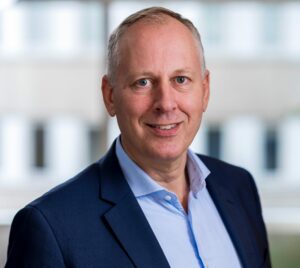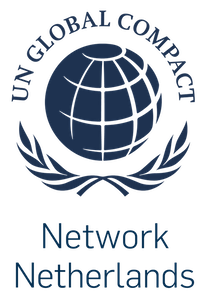Philips is a purpose-driven company that aims to improve the health and well-being of 2 billion people annually by 2025 through innovation. They aim to lead with innovative solutions that combine products, systems, software, and services and leverage clinical and operational data. Their responsibility towards society and the planet is rooted in their founders’ vision and deeply embedded in how they do business.
Jan-Willem Scheijgrond, the Chairman of the Board of UN Global Compact Netherlands, is The Vice president of Global Government & Public Affairs (GPA). He leads the network responsible for the relations with governments and related stakeholders to address societal challenges. The role of GPA is to be an influential advocate amongst key supranational, international, and national government stakeholders on critical health and corporate-related issues. This of course includes advocacy on issues such as the human right to health and addressing climate change.
Philips and their contribution to SDG’s
Philips has chosen 3 sustainability goals (SDGs) to focus on as they believe that they can take the lead in advancing these goals specifically. Achieving good health & well-being (SDG 3) is most aligned with their core business. However, they set other ambitious goals for 2025 where the main focus is on mitigating climate change (SDG 13) and driving the transition to a circular economy (SDG 12).
“We are doing so by introducing circular business models, making our products, even more, energy efficient, and reducing the number of materials used. We will also minimize waste and team up with customers, partners, and suppliers to reduce our shared environmental footprint. I am really proud of Philips’ strong environmental commitments – we all believe it is our responsibility to leave a healthier planet for future generations.”
Scheijgrond’s personal SDG goal
Although an environmental engineer by training, Jan-Willem Scheijgrond also strongly focuses on a social SDG: gender equality.
“I am a member of the High-Level Commission on the Follow up of the ICPD25, the UN conference that made 12 commitments to improve women’s health, rights, and empowerment. What I noticed is that this isn’t a big private sector focus. That is a pity, as most of the commitments are common sense and make business sense. A lot of the inequality between genders is based on unawareness or ignorance, which is why stronger private sector commitments can be so powerful. By discussing these topics, they become visible, understandable, and solvable.”
“The same passion, a different goal, great learning journey!”
Scheijgrond’s personal advice to other professionals about integrating the SDGs into their business and personal lives is as follows:
“There is no right or wrong way to go about it. However, make sure the goals you decide to work on motivate you and your colleagues or family. If you are the only one passionate about the goals you selected, you either selected the wrong ones or need to become a better ambassador for your program. You could also challenge yourself to pick an SDG to work on that you may be less familiar with. Just like UNGC selected a number of SDGs which still receive too little attention from the Private Sector. Look at me: I started out as an environmental engineer working on solid waste management and now I am passionately defending gender equality. The same passion, a different goal, great learning journey!”




